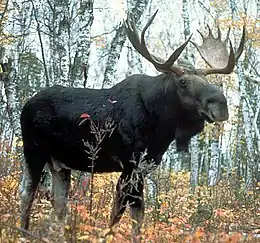大鹿
Chinese
big; great; huge big; great; huge; large; major; wide; deep; oldest; eldest; doctor | deer | ||
|---|---|---|---|
| trad. (大鹿) | 大 | 鹿 | |
| simp. #(大鹿) | 大 | 鹿 | |
Pronunciation
Noun
大鹿
- any kind of large deer
- moose; elk
Japanese
Etymology 1

| Kanji in this term | |
|---|---|
| 大 | 鹿 |
| おお Grade: 1 | しか > じか Grade: 4 |
| kun’yomi | |
| Alternative spelling |
|---|
| 麋 |
From Old Japanese. Analyzable as a compound of 大 (ō, “big”) + 鹿 (shika, “deer”).[1][2] The shika changes to jika as an instance of rendaku (連濁)..
First attested in the Nihon Shoki of 720, with the literal sense of large deer.[1]
The moose or elk (Alces alces) is not native to Japan, and that sense is not attested until much later, in 1884.[1]
And, similar to the confusion in usage of English elk as to whether this refers to Alces alces or Cervus canadensis (also known as the wapiti), the Japanese term too might refer to either.
Pronunciation
- (Tokyo) おおじか [òójíká] (Heiban – [0])[2]
- IPA(key): [o̞ːʑika̠]
Noun
大鹿 • (ōjika) ←おほじか (ofozika)?
- [from 720] a large deer
- [from 1884] a moose, an elk: Alces alces
- Synonyms: (more common term) 箆鹿 (herajika), ムース (mūsu), エルク (eruku)
- [after 1884] a wapiti, an elk: Cervus canadensis
- Synonyms: アメリカ赤鹿 (Amerika akashika), ワピチ (wapichi), エルク (eruku)
Usage notes
As with many terms that name organisms, this term is often spelled in katakana, especially in biological contexts (where katakana is customary), as オオジカ. Not to be confused with 牡鹿 (ojika, “male deer: stag, buck”).
Proper noun
大鹿 • (Ōjika) ←おほじか (ofozika)?
- a district in Itami, Hyōgo Prefecture
Etymology 2
| Kanji in this term | |
|---|---|
| 大 | 鹿 |
| おお Grade: 1 | しか Grade: 4 |
| kun’yomi | |
Compound of 大 (ō, “big”) + 鹿 (shika, “deer”). Appears to be a variation from the ōjika reading.
Pronunciation
- (Tokyo) おおしか [òósh
íká] (Heiban – [0])[3] - IPA(key): [o̞ːɕi̥ka̠]
Proper noun
大鹿 • (Ōshika) ←おほしか (ofosika)?
- A village in Nagano Prefecture
- a surname
- [from 1884] (uncommon) a moose, an elk: Alces alces
- Synonyms: (more common term) 箆鹿 (herajika), ムース (mūsu), エルク (eruku)
Etymology 3
| Kanji in this term | |
|---|---|
| 大 | 鹿 |
| だい Grade: 1 | ろく Grade: 4 |
| goon | on’yomi |
Probably coined in Japan from Middle Chinese-derived components, as a compound of 大 (dai, “great”) + 鹿 (roku, “stag, male deer”).
Pronunciation
- IPA(key): [da̠iɾo̞kɯ̟ᵝ]
Noun
大鹿 • (dairoku)
- (shogi) the great stag, a piece in 大局将棋 (taikyoku shogi, a huge chess variant, played on a 36×36 grid)
See also
- 山鹿 (sanroku, “mountain stag”), the starting piece, which promotes to the dairoku
- 奔鹿 (honroku, “free stag”), to which the dairoku promotes
References
- 1988, 国語大辞典(新装版) (Kokugo Dai Jiten, Revised Edition) (in Japanese), Tōkyō: Shogakukan
- 2006, 大辞林 (Daijirin), Third Edition (in Japanese), Tōkyō: Sanseidō, →ISBN
- 1998, NHK日本語発音アクセント辞典 (NHK Japanese Pronunciation Accent Dictionary) (in Japanese), Tōkyō: NHK, →ISBN